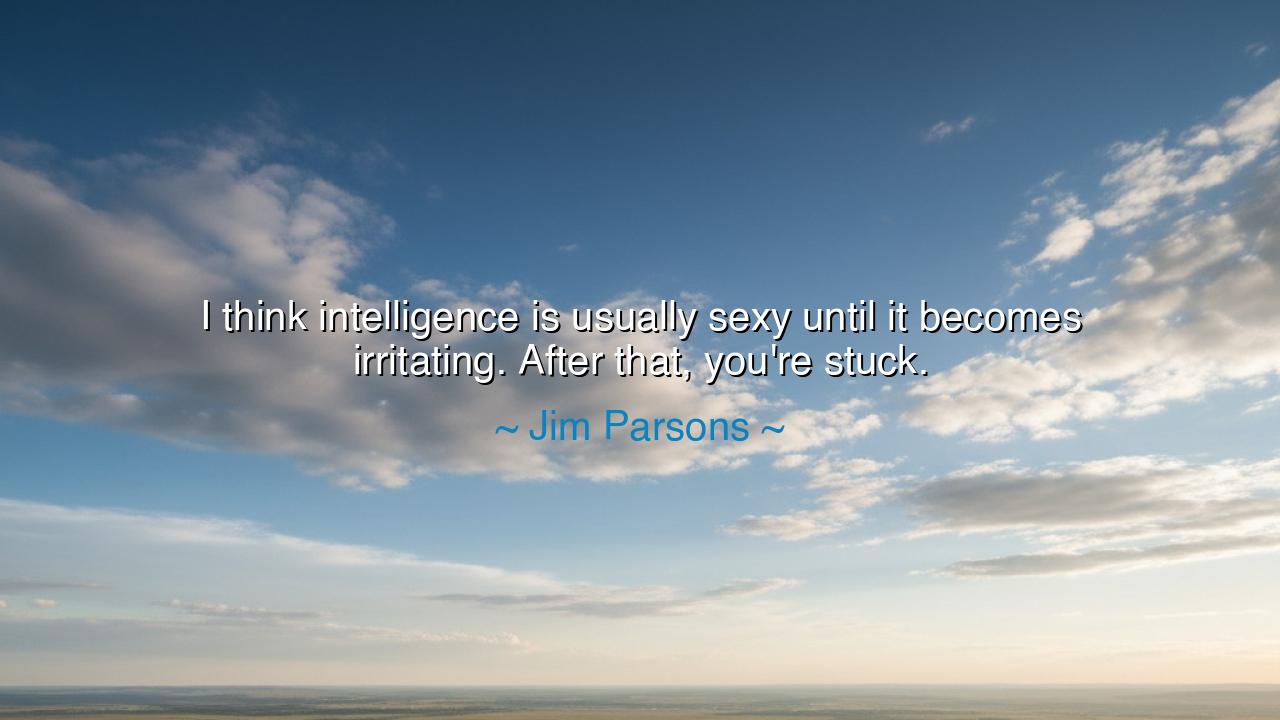
I think intelligence is usually sexy until it becomes irritating.
I think intelligence is usually sexy until it becomes irritating. After that, you're stuck.






The actor and thinker Jim Parsons, whose wit and depth have charmed audiences across the world, once remarked: “I think intelligence is usually sexy until it becomes irritating. After that, you’re stuck.” Though spoken with the humor and candor of a man who has studied human nature closely, these words hold within them a profound truth about the dual nature of intelligence — that it can both attract and repel, enlighten and exhaust, depending on the wisdom with which it is wielded. Parsons, who became the face of genius through his portrayal of the brilliant yet socially inept Sheldon Cooper, understood that intellect alone is not the crown of virtue. It is a flame — bright and desirable at first, but one that can burn if not tempered by humility, empathy, and grace.
When Parsons speaks of intelligence as “sexy,” he speaks to an ancient truth: the allure of the mind. For since the dawn of civilization, humankind has admired not only beauty of form but beauty of thought. To encounter a sharp, curious intellect is to feel one’s own spirit stirred, to glimpse the divine spark of understanding that lifts us above the beasts. In conversation, in art, in love, the intelligent mind captivates like a well-played melody — it challenges, it surprises, it awakens. The ancient Greeks worshipped Athena, goddess of wisdom, as both powerful and alluring, for they knew that intelligence possessed a magnetism beyond the physical. The mind, when alive with curiosity, radiates a beauty of its own.
But Parsons’ quote warns of what happens when that flame burns too hot — when intelligence crosses the delicate threshold from inspiration to irritation. For knowledge without humility becomes arrogance, and cleverness without kindness becomes cruelty. The mind that seeks only to display its brilliance eventually deafens itself to the voices of others. What was once captivating turns cold, what was once admired becomes exhausting. The same intelligence that first drew people near begins to drive them away, for it has lost the balance of heart. In this way, Parsons speaks not just of attraction, but of the fragile equilibrium between mind and soul.
History offers us many examples of this truth. Consider Napoleon Bonaparte, a man of vast intellect and unmatched strategic genius. In his youth, his intelligence enthralled those around him; his vision dazzled France and reshaped the world. But as pride grew in his mind, so too did his isolation. His brilliance became tyranny, his insight turned into obsession, and the light that once inspired nations cast the shadow of empire and war. His story reminds us that intelligence divorced from humility leads to ruin, for the mind that worships itself forgets the wisdom of restraint.
Likewise, in our own lives, we encounter this rhythm of admiration and irritation. A person of quick thought and sharp tongue may enchant us at first — their ideas, their confidence, their insight. Yet over time, if their intelligence becomes a tool for dominance rather than connection, it ceases to delight. What Parsons calls being “stuck” is that uncomfortable space where brilliance turns to burden — where what once drew people together now creates distance. The mind, left unchecked by compassion, becomes its own prison. For the greatest wisdom is not to win every argument, but to know when silence and understanding speak louder than words.
Parsons’ insight is also a reflection on human relationships, for love, friendship, and trust are not sustained by intellect alone. Intelligence may open the door, but empathy keeps it open. The ancients knew this too — that reason without emotion leads to sterility, and emotion without reason to chaos. True wisdom, they taught, lies in harmony: the blending of clarity and compassion, of thought and tenderness. Intelligence, when joined with humility, becomes not irritating but illuminating — a light that warms rather than blinds.
So let this be the teaching drawn from Parsons’ words: Do not let your intellect become your idol. Let it serve, not dominate. Cultivate curiosity, but temper it with patience. When you speak, let your words build bridges, not walls. When you think, let your thoughts bring light, not pride. For the truly wise are not those who know the most, but those who understand how to use knowledge gently, kindly, and well.
And remember, my children of thought and reason: intelligence, like fire, must be tended with care. When it burns with purpose, it enlightens the world; when it burns for vanity, it consumes the soul. So let your mind be bright, but your heart be brighter. Seek not only to be intelligent, but to be wise — for wisdom, unlike intelligence, never irritates. It inspires, uplifts, and endures.






AAdministratorAdministrator
Welcome, honored guests. Please leave a comment, we will respond soon